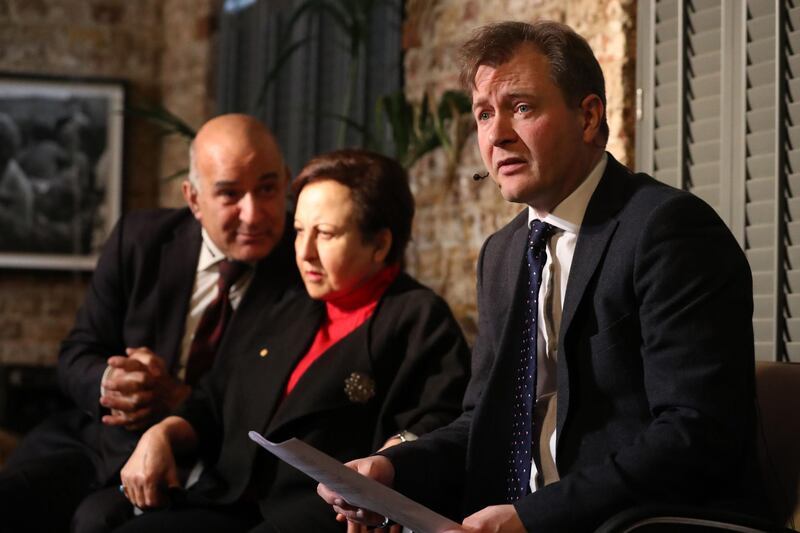An international reputation as a human rights defender was no defence for Shirin Ebadi, a Nobel Peace Prize winner, when the Iranian regime went after her.
On the pretext of a tax inquiry, the authorities seized her home, the office of her campaigning organisation and even the 2003 medal she earned as the first female Peace Prize winner from the Islamic world. Officials froze her assets and confiscated the bank security deposit box where she stored her medal for safe keeping.
Her sister was briefly jailed and her husband blackmailed into a televised denunciation of her work before she got the medal back. The regime still has her assets in a concerted effort to blunt her campaigning zeal and intimidate her into silence.
It has not worked. Twenty years after she was held in solitary confinement and a decade after she went into exile in the UK, Ms Ebadi, now 71, is fighting a new battle on behalf of a colleague refused hospital treatment while in jail for campaigning against the death penalty.
"After 2009, I couldn't come back to my country – not because I'm afraid of being sent to prison as I know I can tolerate this – but I should be somewhere where I can be more useful for my goal and my country," said the former judge to The National.
Narges Mohammadi, 46, the deputy director of Ms Ebadi’s group, the Defenders of Human Rights Centre, went on hunger strike on Monday with her cellmate Nazanin Zaghari-Ratcliffe, a British-Iranian dual national.
Both women complain that officials at Evin prison have refused them hospital treatment for a series of serious complaints. Ms Mohammadi is serving 16 years in jail for spreading propaganda as part of her campaigning work.
“She’s very brave and very clever,” said Ms Ebadi. “She believes she must live in in Iran because she can be more effective for human rights.”
It has come at significant personal cost. Ms Mohammadi’s husband – a journalist who has spent more than 14 years in prison for his outspoken comments about the regime - and their children, 12-year-old twins, are living in exile in France.
Ms Zaghari-Ratcliffe is one of 37 dual nationals in detention in Iran, according to figures compiled by Ms Ebadi’s charity, though she believes the number could be considerably higher.
Many families of those detained have remained quiet on the advice of governments amid diplomatic efforts to free them. But Ms Ebadi believes that the best defence of those detained is by raising their cases within international bodies and the media to hold Tehran responsible for any ill treatment.
“It’s very good that all the families are starting to tell their stories even though some are scared,” she said. “Public opinion is very important for the governments.”
She cited her own experience of spending 25 days in solitary confinement for her involvement in efforts to bring to justice security forces who killed a university student protesting about the closure of a newspaper in July 1999.
Ms Ebadi was jailed for 15 months after she unsuccessfully sought to highlight the evidence of a disaffected member of the security services. “There was no bed, no chair, no table, only a carpet and one blanket,” she said. “It’s very difficult to sleep without a pillow.
“There’s one light and it’s always on. There are no windows to the outside world and you’re isolated. Sometimes you cannot understand the time or whether it’s day or night. Psychologists say it’s like a white torture.”
She attributes her own release to an international outcry and her sentence was reduced on appeal. Four years later, she won the Nobel Peace Prize for her “efforts for democracy and human rights” often working for free for victims of the regime.
Ms Ebadi became the first woman in the history of the Iranian judicial system to serve as a judge at the age of 22. She initially supported the 1979 revolution but quickly lost faith in the motives of the theocratic regime.
Like all high-ranking women officials, she was removed from her position as president of a Tehran court and given an administrative role.
_______________
Read more:
[ Nobel Peace Prize winner Nadia Murad to appear at UAE conference ]
[ Laser innovations scoop Nobel Prize in Physics ]
[ US arrests two Iranians who spied on dissidents ]
_______________
She exploited new rules to retire at the age of 36 before eventually setting up her own legal practice to defend the rights of people affected by regime policies, often for free.
She opted to stay out of the country following the assault on her practice to condemn state oppression following the protests that were crushed after the contested victory of President Mahmoud Ahmadinejad in 2009.
She spoke on Monday at a public event on Monday in London alongside Richard Ratcliffe, the husband of Ms Zaghari-Ratcliffe, to put pressure on the regime.
She identified 12 other prisoners who were denied treatment and highlighted the case of one who died last month.
“My campaign now is securing the release of political prisoners and prisoners of conscience,” she said. “In prison nobody can hear me.”






